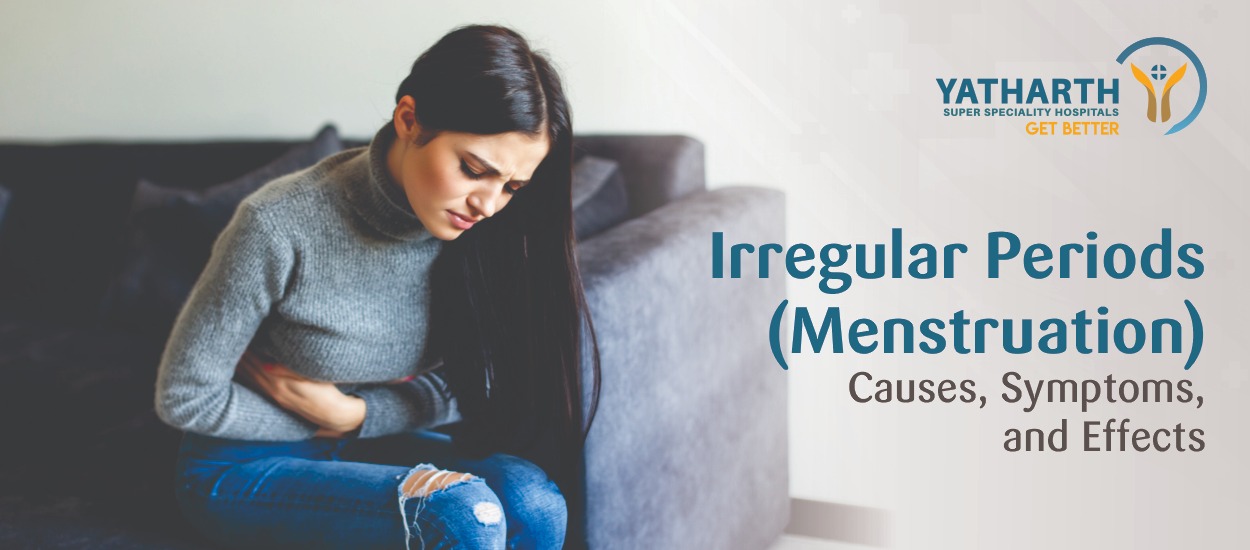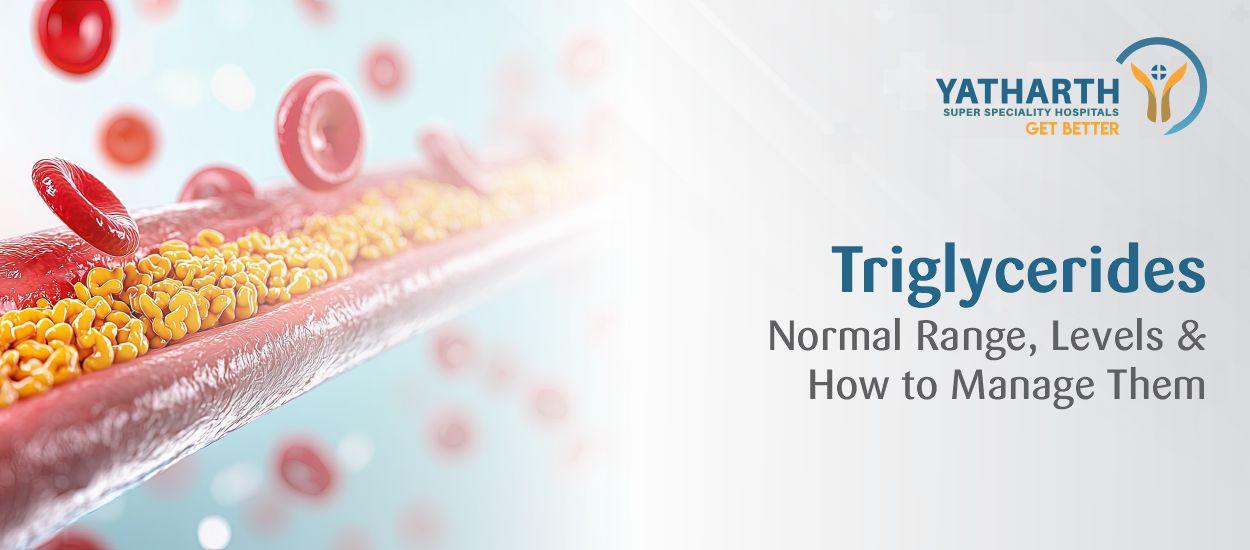Menstruation is a natural process in women’s reproductive health, and therefore, any changes in its timing or flow are bound to raise concerns. While occasional variation in the menstrual cycle is common, frequent or prolonged irregularities may point to underlying hormonal or health issues. Irregular periods can affect not just physical health but also emotional well-being and day-to-day comfort. That said, understanding the possible causes and recognising early symptoms can help ensure timely diagnosis and treatment. In this article, we will explore the causes, symptoms, diagnosis, and treatment options for irregular periods, along with effective self-care tips and guidance on when to seek medical help. Let’s start by understanding the basics.
What are Irregular Periods?
Irregular periods, also known as irregular menstruation, refer to any change in the normal menstrual pattern - whether in timing, flow, or duration. A typical menstrual cycle lasts between 21 and 35 days, with bleeding lasting about three to seven days. When cycles become shorter, longer, unpredictable, or vary significantly from month to month, they are considered irregular.
These irregularities may appear as missed periods, very frequent cycles, heavy bleeding, light spotting, or bleeding between periods. Occasional changes can occur due to stress or illness, but consistent irregularity often signals a hormonal or reproductive health concern that requires evaluation.
Understanding what counts as an irregular cycle helps women recognise when to seek advice from a gynaecologist and take timely steps toward diagnosis and management.
Common Causes of Irregular Periods
Several factors can disrupt the body’s natural menstrual rhythm, resulting in cycles that are shorter, longer, heavier, or sometimes missed altogether. While occasional irregularity may be harmless, persistent changes often point to underlying health or lifestyle issues that need attention. Moreover, while some causes are temporary, others require medical evaluation and treatment to restore normal menstrual function.
Common causes of irregular periods include:
-
Hormonal Imbalances: Fluctuations in oestrogen and progesterone can disrupt the menstrual rhythm. This is commonly seen in conditions such as polycystic ovary syndrome (PCOS) and thyroid disorders.
-
Stress and Lifestyle Factors: Emotional stress, drastic weight changes, poor nutrition, or excessive exercise can interfere with hormone production and delay ovulation.
-
Perimenopause: As women approach menopause, hormonal changes can cause cycles to become irregular, shorter, or heavier.
-
Medications and Contraceptives: Certain birth control pills, intrauterine devices (IUDs), and medications for mental health or chronic illness may alter bleeding patterns.
-
Chronic Illness or Eating Disorders: Conditions that affect metabolism, such as diabetes or eating disorders like anorexia, can lead to irregular menstruation.
-
Underlying Gynaecological Conditions: Structural or inflammatory conditions such as fibroids, endometriosis, or pelvic infections can cause abnormal bleeding or missed cycles.
Types of Abnormal Menstruation
Irregular menstruation can appear in several forms, each reflecting a different kind of disruption in the menstrual cycle. Understanding these patterns helps identify the underlying issue and guide appropriate treatment.
The main types of abnormal menstruation include:
-
Amenorrhoea: The complete absence of menstruation. It is further divided into two sub types:
-
Primary amenorrhoea refers to when a girl has not started her periods by the age of 15.
-
Secondary amenorrhoea occurs when a woman who previously had normal cycles stops menstruating for three months or more.
-
-
Oligomenorrhoea: Infrequent or delayed menstruation, with cycles that extend beyond 35 days.
-
Dysmenorrhoea: Painful periods caused by uterine contractions, often accompanied by cramps, nausea, or lower back pain.
-
Menorrhagia: Heavy or prolonged bleeding during periods, sometimes leading to anaemia and fatigue.
-
Metrorrhagia: Bleeding or spotting that occurs between regular menstrual cycles.
-
Polymenorrhoea: Very frequent menstruation, with cycles shorter than 21 days.
-
Hypomenorrhoea: Unusually light bleeding or reduced menstrual flow.
-
Hypermenorrhoea: Excessively heavy bleeding that may last longer than seven days.
Symptoms and Effects of Irregular Periods
Irregular periods can manifest in many ways, depending on the underlying cause. Some women may experience minor changes, while others notice significant variations in their menstrual cycle that affect daily life and overall well-being.
Common symptoms of irregular periods include:
-
Missed, delayed, or very frequent periods.
-
Unusually heavy or light menstrual bleeding.
-
Spotting or bleeding between periods.
-
Severe menstrual cramps or pelvic pain.
-
Changes in the length or duration of the cycle.
Possible effects on the body:
-
Anaemia: Heavy or prolonged bleeding can lower haemoglobin levels, leading to fatigue and weakness.
-
Fertility Problems: Irregular ovulation may make it difficult to conceive.
-
Hormonal Symptoms: Acne, hair fall, or facial hair growth, especially in conditions such as PCOS.
-
Mood Changes: Hormonal fluctuations can cause irritability, anxiety, or low mood.
Persistent irregularity can also indicate hormonal or metabolic conditions that need medical attention. Recognising these symptoms early allows for timely diagnosis and treatment, helping maintain reproductive and overall health.
How are Irregular Periods Diagnosed?
Diagnosing irregular periods begins with a thorough medical evaluation. A gynaecologist will assess overall health, review menstrual history, and perform specific tests to determine the reason for the irregularity.
Common diagnostic steps include:
-
Medical and Menstrual History: The doctor will ask about the frequency, duration, and flow of periods, along with lifestyle factors such as stress, diet, or exercise.
-
Physical and Pelvic Examination: Helps detect signs of hormonal imbalance or structural conditions like fibroids or ovarian cysts.
-
Blood Tests: Used to check hormone levels, including thyroid hormones, prolactin, oestrogen, and progesterone. These tests can also detect anaemia or metabolic disorders.
-
Pelvic Ultrasound: Provides detailed images of the uterus and ovaries to identify abnormalities such as cysts,fibroids, or endometrial thickening.
-
Additional Tests: In certain cases, a Pap smear, endometrial biopsy, or MRI may be recommended to rule out infections, polyps, or other reproductive disorders.
Accurate diagnosis is essential to address the root cause of irregular menstruation and guide a personalised treatment plan that supports long-term hormonal balance and reproductive health.
Treatment for Irregular Periods
Treatment for irregular periods depends on the underlying cause, overall health, and reproductive goals. In most cases, a combination of medical management and lifestyle changes helps restore regularity and balance to the menstrual cycle.
Common treatment options include:
-
Medications and Hormonal Therapy: Birth control pills or hormonal medications may be prescribed to regulate cycles and manage symptoms like heavy bleeding or cramps. In thyroid-related cases, hormone replacement therapy may help restore normal function.
-
Lifestyle Modifications: Maintaining a balanced diet, exercising regularly, and managing stress through yoga, meditation, or relaxation techniques can significantly improve hormonal balance.
-
Management of Underlying Conditions: For conditions such as polycystic ovary syndrome (PCOS), endometriosis, or thyroid disorders, targeted treatment plans are designed to address the root cause.
-
Nutritional Support: Iron and vitamin supplements may be recommended to correct deficiencies caused by heavy or prolonged bleeding.
-
Surgical Options: In rare cases where fibroids, polyps, or other structural issues are responsible, minimally invasive procedures may be required.
Early and consistent treatment not only helps regulate menstruation but also prevents complications such as anaemia, infertility, and hormonal imbalance, promoting long-term reproductive health.
Preventive Measures and Self-Care Tips
While not all cases of irregular periods can be prevented, maintaining a healthy lifestyle plays a major role in keeping menstrual cycles balanced and predictable. Small, consistent changes in daily habits can improve hormonal health and reduce the likelihood of irregularities.
Here are some helpful self-care measures:
-
Maintain a Healthy Weight: Both underweight and overweight conditions can disrupt hormone production and ovulation.
-
Follow a Balanced Diet: Include iron-rich foods, fresh fruits, vegetables, whole grains, and proteins to support overall hormonal function.
-
Manage Stress: Practice mindfulness, yoga, or relaxation exercises to lower cortisol levels, which can interfere with menstrual hormones.
-
Exercise Moderately: Regular physical activity helps maintain hormonal balance, but excessive workouts can delay or stop periods.
-
Sleep Well: Aim for 7-8 hours of quality sleep daily to regulate stress hormones and improve reproductive health.
-
Avoid Smoking and Alcohol: These can affect hormone levels and menstrual regularity.
-
Regular Check-ups: Routine visits to a gynaecologist help detect any menstrual or reproductive issues early.
Adopting these habits supports not only menstrual regularity but also overall health, energy levels, and emotional well-being.
Why Choose Yatharth Hospital for Irregular Period Treatment?
At Yatharth Hospital, we understand how irregular periods can affect daily life, emotional well-being, and future reproductive health. Our approach focuses on identifying the root cause of menstrual irregularities through detailed diagnosis and personalised treatment plans designed for each woman’s unique needs. We offer:
Experienced Gynaecologists
Our team of highly skilled gynaecologists and reproductive health specialists provide comprehensive care for all menstrual disorders, including irregular cycles, PCOS, thyroid-related imbalances, and other hormonal issues.
Advanced Diagnostic Facilities
At Yatharth Hospital, we use advanced diagnostic tools such as pelvic ultrasound, hormone analysis, and reproductive health screenings to ensure accurate assessment and timely treatment.
Personalised and Compassionate Care
We believe in building trust through clear communication and continuous support. Our specialists work closely with each patient to create treatment plans that fit their lifestyle and future fertility goals, ensuring both comfort and confidence throughout the process.
At Yatharth Hospital, our priority is to help women regain hormonal balance and menstrual health through expert care, modern technology, and an empathetic approach to women’s wellness.
Restoring Balance with Expert Women’s Care
Menstrual irregularities are common, but when they persist, they can signal deeper hormonal or reproductive issues that deserve timely attention. With accurate diagnosis, proper treatment, and the right guidance, most women can regain healthy, predictable cycles and improve overall well-being.
At Yatharth Hospital, we are committed to supporting women through every stage of their reproductive health journey. Our team of experienced gynaecologists ensures that every patient receives personalised, compassionate, and expert care in a comfortable and safe environment.
To consult a gynaecologist at Yatharth Hospital, book an appointment online and our team will guide you through the next steps with complete care and support.















